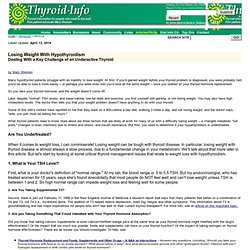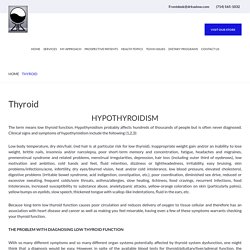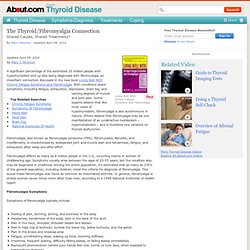

Thyroid hormone resistance treatment. Janet, 40, had been healthy until she suffered a case of viral encephalitis 6 years prior to seeing me.

During her hospitalization, her thyroid hormone levels (which control metabolism) were found to be normal. Over the next few months, however, she gained 40 pounds and developed swelling of her hands, feet and face. Her thyroid gland began enlarging and she was treated with thyroid hormone, which had no effect. Later that year, she gained 23 more pounds, her hair became brittle and her cholesterol level became quite elevated. Tests of her thyroid function were again normal. She was put on Cytomel, a drug 10 times more potent than regular thyroid hormone. Tests indicated Janet had normal thyroid function, but she exhibited various symptoms of hypothyroidism (low thyroid function). After careful analysis, I suspected partial peripheral resistance to thyroid hormone syndrome. Losing Weight With Hypothyroidism / Thyroid Disease Information Source - Articles/FAQs.
By Mary Shomon Many hypothyroid patients struggle with an inability to lose weight.

At first, if you'd gained weight before your thyroid problem is diagnosed, you were probably told you'd be able to lose it more easily -- or perhaps you were even told you'd lose all the extra weight -- once you started on your thyroid hormone replacement. So you take your thyroid hormone, and the weight doesn't come off. Later, despite "normal" TSH levels, and lower-calorie, low-fat diets and exercise, you find yourself still gaining, or not losing weight.
You may also have high cholesterol levels. Some of this site's visitors have reported to me that they were on a 900-calorie a day diet, walking 3 miles a day, and not losing weight, and the doctor says, "well, you just must be eating too much. " Are You Undertreated? When it comes to weight loss, I can commiserate! 1. First, what is your doctor's definition of "normal range. " 2. 3. DrWeil.com - Official Website of Andrew Weil, M.D.
About.com: Newsroom - Purdue student sees thyroid hormone's link to vision; wins Sigma Xi award. WEST LAFAYETTE, Ind. - A Purdue University student suspects altered thyroid activity could be the cause of nearsightedness and farsightedness and has won an award to support her research.

Zeran Li, an undergraduate student in biological sciences, has won a Grant-in-Aid award from Sigma Xi, an international honor society of research scientists and engineers, to study the relationship of thyroid hormone production to proper eye growth. Myopia and hyperopia, commonly referred to as nearsightedness and farsightedness, affect 3.8 billion people worldwide, according to the International Center of Eye Education. "Nearsightedness and farsightedness are commonly corrected with prescription eyeglasses or laser surgery, but glasses can be cumbersome and surgery is invasive," Li said.
"We hope that with a better understanding of the molecular controls of eye growth, we can design novel pharmacological approaches to treat people affected by impaired vision. " Thyroid. The term means low thyroid function.

Hypothyroidism probably affects hundreds of thousands of people but is often never diagnosed. Clinical signs and symptoms of hypothyroidism include the following (1,2,3): Because long-term low thyroid function causes poor circulation and reduces delivery of oxygen to tissue cellular and therefore has an association with heart disease and cancer as well as making you feel miserable, having even a few of these symptoms warrants checking your thyroid function. With so many different symptoms and so many different organ systems potentially affected by thyroid system dysfunction, one might think that a diagnosis would be easy. However, in spite of the available blood tests for thyroid/pituitary/liver/adrenal function, the diagnosis is often missed.(1,2) One of the most common mis-conceptions regarding thyroid function is the assumption that and reliance on the requirement that the diagnosis of hypothyroidism depends on an elevated TSH level.
Thyroid Disease, Hypothyroidism & Fibromyalgia. Updated April 09, 2014 by Mary J.

Shomon A significant percentage of the estimated 20 million people with hypothyroidism end up also being diagnosed with fibromyalgia, an important connection discussed in my new book Living Well With Chronic Fatigue Syndrome and Fibromyalgia. Both conditions share symptoms, including fatigue, exhaustion, depression, brain fog, and varying degrees of muscle and joint pain. Some experts believe that like most cases of hypothyroidism, fibromyalgia is also autoimmune in nature. Fibromyalgia, also known as fibromyalgia syndrome (FMS), fibromyositis, fibrositis, and myofibrositis, is characterized by widespread joint and muscle pain and tenderness, fatigue, and exhaustion after sleep and after effort. Fibromyalgia affects as many as 8 million people in the U.S., occurring mainly in women of childbearing age.
Fibromyalgia Symptoms Symptoms of fibromyalgia typically include: ____ Widespread pain for at least 3 months.